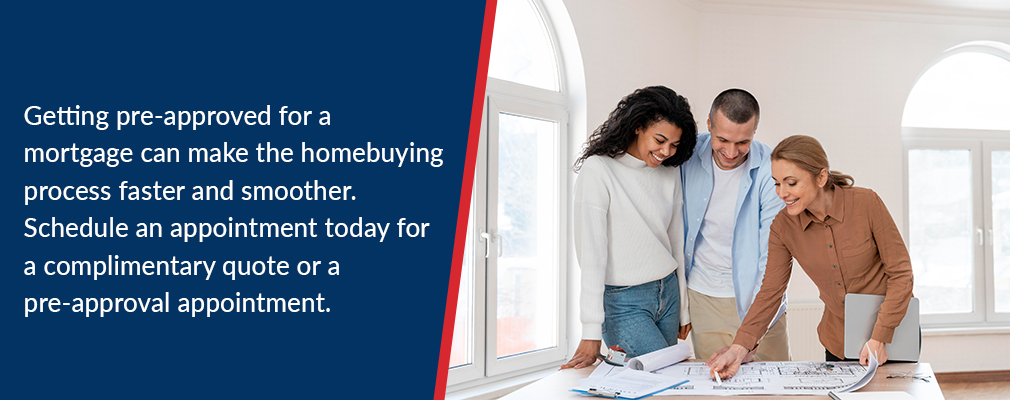With recent increases in mortgage rates, many homebuyers are taking extra time to carefully examine the wide variety of mortgage products out there to find the right choice or best value for their specific needs.
In this post, we will discuss the ins and outs of the many home lending products we offer here at American National, from pros and cons to eligibility requirements. Whether you’re looking to get preapproved for a mortgage or are ready to apply for a home loan, this comprehensive guide will help you make your upcoming financial decision with confidence.

How can I find the perfect home loan for my needs?
If you’re beginning to do your research on the best home loan for your lending needs, you might be surprised (or daunted!) by the number of lending products out there—each with their own nuances and eligibility requirements. From conventional mortgages to government-backed loans, there are many options available to suit a variety of needs. Working with a trusted mortgage lender is the best way to match the right loan for yours. But familiarizing yourself with common loan products is also essential in understanding your options. Let’s take a look at the most popular home financing options available through American National.
Conventional Home Loans
Conventional home loans, also called conforming loans, are private loans secured through an independent financial institution, like your bank. For conventional mortgages, your lender may require a down payment of 20%, and they may have stricter credit or income requirements (and the maximum loan amount is capped), but the lending process tends to be a more straightforward experience, and they are the most popular variety of home loans. Borrowers who don’t put 20% down on their home will be required to pay private mortgage insurance (PMI) each month, at least until the equity in their home has reached 20%. Generally, conventional mortgages come in two varieties: adjustable rate and fixed rate.
Adjustable-Rate Home Loans
An adjustable-rate mortgage (ARM) is a kind of home loan product that offers a fluctuating interest rate. Instead of a fixed rate for the life of your home loan, your loan has a low, locked introductory rate for the first few years, after which, it can be periodically adjusted up or down, based on the current market rate. As your rate changes, your monthly payment will change, too. The duration of the introductory period and frequency of adjustments depends on the kind of ARM. The most popular formulation of the ARM—the 5/1—has a rate lock for five years followed by adjustments every one year thereafter. ARMs come in a variety of other configurations, depending on the lender, including 3/1, 7/1, 10/1, 5/6, and 7/6.
So when do adjustable rate mortgages make the most sense? Their low initial rate can be a cost-effective choice during times of higher interest rates, especially if you expect the market rate to come down in the coming years, resulting in lower interest than today’s market rates. Additionally, if you plan on moving again or refinancing in a few years, ARMs can also offer you significant savings with their lower introductory rate.
Fixed-Rate Home Loans
Fixed-rate mortgages are the most common form of home loan. Unlike ARMs, the rate you lock in at your closing is the rate will be the rate you have for the duration of your loan, and your mortgage payment won’t change either (though the escrow portion of your payments for taxes and insurance can). Fixed-rate loans offer exceptional stability, and if interest rates are low when you apply for your loan, you can ensure that your rate doesn’t go up, even if current market rates do. When rates are unusually high, it may not make sense to lock them for the 15 or 30 year duration of a fixed rate loan. But if the possibility of rising rates could make your monthly payment, it might make sense to lock in a rate and monthly payment that you know is within your budget.
Visit our Conventional Mortgage Loans page to learn more about our conforming mortgage options.
Alternatives to Conventional Loans
There are many reasons why homebuyers might not find a conventional mortgage to be the right fit for their borrowing needs. Whether you’ll need a lower down payment option, more flexible credit qualifications, or require a larger loan than conventional loans can provide, there are numerous options available through American National Bank and Trust that can fill the gaps.
Jumbo Loans
Conventional loans have lending limits—$726,200 in 2023—which means a significant number of home purchases will fall outside of their eligibility requirements. Large homes, farms, and homes with land may need to utilize a jumbo loan, which can go up to $2 to $3 million, depending on your personal qualifications. And because they are for larger amounts of money, it can be harder to qualify. Like a conventional loan, expect a down payment of 20% or more.
Government-Backed Loans: VA, FHA, and USDA
To put homeownership within reach of members of the armed forces, lower- to moderate-income homebuyers, and rural residents, several government agencies, in partnership with your local bank, offer guaranteed mortgage products. These products typically have more flexible terms and lower down payment requirements, making them great choices for individuals with less-than-perfect credit, less cash on hand, and first-time homebuyers. Let’s take a look at a few of the popular government-backed mortgage programs we offer here at American National Bank and Trust.

VA Home Loans
VA Loans are offered by the Department of Veterans Affairs right through your bank, and provide affordable home loan options to current and retired eligible service members (and their spouses) with more flexible qualification requirements. While a solid credit history is expected, there is no specific credit score number required, and VA loans may allow a higher debt-to-income ratio.
But the biggest benefit of VA loans may be their 0% down payment—borrowers require less cash at closing, putting homeownership within reach for individuals who may struggle coming up with a larger down payment. Additionally, even without a 20% down payment, these loans have no PMI. Instead, they have a low origination fee of 1% or less, that can be paid upfront or incorporated into the loan’s monthly payments.
FHA Loans
Backed by the Federal Housing Authority and offered through your bank, FHA loans are often top choices for first-time homebuyers because of their low down payment requirement of as little as 3.5%. However, they aren’t exclusive to first-time homebuyers, and their flexible credit requirements and lower down payment options can be beneficial to any borrower.
While conventional home loans may require credit scores of 740 or higher, FHA loans only require 580 to qualify for a 3.5% down payment, and 500 if you are able to put 10% down. Lenders may accept a higher debt-to-income ratio, too, depending on your credit score. There is no private mortgage insurance with FHA Loans, but they do have a mortgage insurance premium that is paid upfront or monthly, for the life of your loan. The major drawback of these loans is that they do require an in-depth inspection, which may be less desirable for sellers. However, this extra measure is put into place to ensure borrowers are getting a safe, secure place to live.
USDA Rural Home Loans
If you’re a homebuyer seeking to purchase or renovate a property in a rural location, USDA Guaranteed Loans may be a great alternative loan choice for you. Also offered through your bank, these loans not only offer competitive rates and flexible terms, they also require no down payment (and no PMI!). USDA loans do have income limits which vary by county, and require a specific inspection as well as an annual fee currently set at .35% of the loan balance. But if you qualify, the lower interest rates and flexible qualifying requirements usually offset these slight drawbacks for buyers.
USDA Home Loans have one overarching requirement, however: the house must be located in a designated rural area. Many areas that American National serves fortunately fall into this category—but not all do. To find out if the property you are interested in qualifies, use their USDA Eligibility Property Lookup Map.
Visit our VA, FHA & USDA Home Loans page to learn more about these alternative mortgage options.
Construction and Land Loans
Want a unique home that you design and build yourself? Looking to build your own home on a plot of land you already own? Interested in a new construction development? Mortgage products are designed for pre-existing homes, but there are numerous home loan products out there that allow you to purchase land and pay for the planning and construction of a custom home. Here are some loan products you can utilize to achieve your dream of building your own home.
Construction and Construction-to-Permanent Loans
Construction loans finance building projects, covering the cost of architectural design, building materials, labor, and permits. Unlike a mortgage loan, these are short-term loans, not meant to last beyond the building phase—when the home is done, you will need to finance it using a more traditional mortgage product. The beauty of a construction loan is that you are often only required to pay interest during the short life of the loan (usually about a year). The downside is that once your loan term is over and your home is complete, you will need to apply for a new home loan to cover the balance, paying a new set of closing costs with it.
That’s where construction-to-permanent loans can come in handy. A construction-to-permanent loan begins as short-term financing before converting to a mortgage after the new house is built. This means that you can not only avoid the hassle of a second loan application, but also save money on closing costs.
Visit our Home Construction Loans page to learn more about our offerings at American National.
Land and Lot Loans
While you can use a construction loan to buy land, if you’re not ready to start on your building project yet or are using another method of financing construction, it may make sense to utilize a loan specifically designed for land purchases. Generally speaking, the more “improved” the land is, the easier it will be to obtain financing for it. Improvements usually include utility hookups, clearing, and grading. Speaking with your lender can help you determine if a land or lot loan is the best choice for your project.
Visit our Land & Lot Loans page to learn more about our offerings at American National.

Refinancing a Home Loan
Already own a home? Not happy with your current mortgage terms? Refinancing an existing mortgage can help you reduce your monthly payments, reduce overall interest costs, or even obtain access to some of the equity in your home to pay for large expenses.
When you refinance a loan, you pay off your original loan with an entirely new loan with new terms. You’ll need at least 20% equity in your home to qualify for a refinance and pay a new set of closing costs upfront. But if mortgage rates have gone down, or your ARM rate is about to go up, it can make good financial sense. Speak to your lender to see if refinancing is the right choice for you or visit our Mortgage Loan Refinancing page to learn more.
What is mortgage pre-approval?
When you’re ready to start shopping for homes, most realtors will want you to get a pre-approval for a loan from your bank to not only have a more official understanding of your budget, but also that, if you make an offer, it’s likely you will have funds available to follow through with it.
Some homebuyers start with a pre-qualification—here your income and debts are self-reported to a lender, and you are given a letter that states what you may be qualified to borrow. While this is a good first step, it’s more of an estimate than a guarantee.
Pre-approvals, on the other hand, require a lender to look at actual documentation of your income, assets, and debts, and in return you will receive a letter approving you for a specific loan amount and interest rate, usually good for 90 days. While you are not committed to using that specific loan product, if you do decide to do so, your final mortgage application can go much more smoothly with a pre-approval in hand. And at American National, you can apply for your pre-approval online, from the convenience of your home!
How can a mortgage lender help me find a home loan?
Navigating a home purchase is a complex undertaking, and finding the right financing can be one of the most complicated aspects. Working with a lender you can trust is essential to making your home buying experience go as smoothly as possible. As Teresa Davis, one of our mortgage lenders serving Lynchburg, Westlake, and Bedford, Virginia explains, “The very first step is to reach out to a knowledgeable lender…someone who can assist you with finding the best product that fits your needs.”
Our mortgage lending team at American National Bank and Trust Company is deeply rooted in the community, and understands our local markets in North Carolina and Virginia better than any national lender possibly could. Our experienced local lenders will work with you as you apply for a mortgage, examining your complete financial picture, housing goals, and current market conditions to match the right loan product with your lending needs. We pride ourselves on our personalized, responsive service.
Apply for your pre-approval online or make an appointment with us today to begin your path on the road to homeownership!

